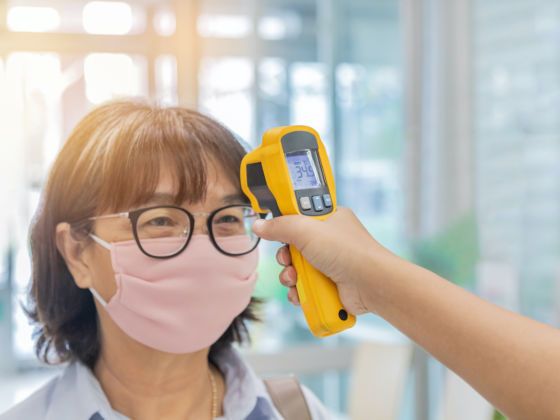No one can look ahead to the post-pandemic world and claim to know what it will look like. There are, however, two certainties: People will be eager to travel again, and travel itself will be very different for quite some time. Exactly what the airport experience will look like is anyone’s guess, but we already have some clues. Airports and airlines know that the only way to get people traveling again is to reassure them that the experience will be safe. The only way to do that is by completely overhauling sanitation measures, both onboard flights and in the airports themselves. The result is likely to be a completely changed airport experience designed to dramatically reduce the number of passenger touchpoints.


The Future of Air Travel Is Uncertain, but Here’s What It Might Look Like
Flight check-ins, usually a fairly automatic, mindless process, will have to be completely reimagined. Whether it’s checking in at the desk with a human being or using a kiosk, these are touchpoints that present a serious sanitation risk. That’s why the World Travel and Tourism Council is reporting that major airports like JFK, Heathrow, and Singapore Changi will probably include mostly online check-in. All-biometric check-in systems will likely become ubiquitous across many major airports, as well as methods for bag checking that don’t involve airport staff. This could also involve a UV disinfection tunnel for the luggage itself after it’s dropped off.
Indeed, some airports have already introduced new disinfection methods. According to The Telegraph, “it may sound futuristic, but UV sanitation is likely to become commonplace at the world’s airports. London Heathrow says it is to begin trialing the process for its security trays.”
More important than disinfecting luggage and belongings, however, will be making sure that passengers themselves are healthy. Airports can be expected to install hand sanitation stations and even thermal scanning to check crowds for fever-grade temperatures. Hong Kong International Airport is testing a full-body disinfection booth developed by Cleantech, which would sanitize passengers with an antimicrobial coating that can remotely kill germs. It’s also using cleaning robots to disinfect public areas.
Much like check-in, the boarding process will also likely become touchless. Facial recognition software is already being used in some US airports for international flights, and many airlines have introduced strict new sanitation measures.
In the aircraft, electrostatic spraying of cabins, blocked middle seats, and protective equipment for the cabin crew will likely be commonplace, while a growing number of airlines are now requiring passengers and crew to wear masks.
Air Canada recently introduced an initiative called Cleancare+, including new cleaning protocols for aircraft and mandatory temperature checks for all passengers before flights. Perhaps even more reassuring, the airline guarantees that it will not sell the seat directly behind you.
Samuel Elfassy, VP of safety at Air Canada, expressed optimism about the situation to Bloomberg. “This creates incredible opportunity for innovation,” he said. “The post-pandemic world will include screening technologies that detect vital signs and provide a better understanding of what an individual’s health looks like, and whether or not that person should be flying.”
Airlines are also getting the word out about their HEPA air filters — an air filtration system used by all airlines. The system removes impurities from the air, making plane cabins one of the safest places for you to inhale. According to the EPA, HEPA filters catch “at least 99.97 percent of dust, pollen, mold, bacteria, and any airborne particles.” It’s a common misconception that airplane air is circulated throughout the cabin, so you’re constantly breathing in other people’s germs. Because HEPA filters the air every three minutes, however, the vast majority of contaminants are removed. Dispelling the myth about airplane air, and educating passengers about HEPA filters, will be crucial to restoring confidence in air travel.
Upon arrival, passengers can expect to undergo some kind of health check, whether it’s a temperature screening, a blood test, or even being asked to present proof of immunity or vaccination. In Hong Kong and Vienna, international passengers are already being given blood tests before being allowed to enter the country, and in Dubai passengers receive blood tests before departing.
Just because travel is changing, that doesn’t mean it’s all for the worse. With heightened sanitation measures comes more peace of mind and less anxiety about passing through the airport. Jon Ostrower, editor-in-chief of The Air Current, told The Harvard Business Review, “I think all of these changes will be positive from a passenger’s point of view. But on the flip side, I suspect flying may become more boring for a while, as airlines try to recover financially.”